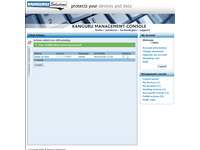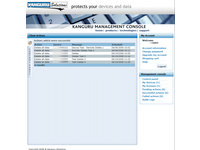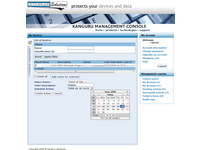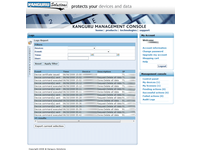Kanguru's Secure USB Memory Stick
Get Tom's Hardware's best news and in-depth reviews, straight to your inbox.
You are now subscribed
Your newsletter sign-up was successful
Data With An Expiration Date
We had no problems using the Web interface for test purposes, and deletion of the USB sticks by remote command of the Kanguru Remote Management Console also worked fine. The deletion command can not only be submitted ad hoc, but it is also possible to send the command to function at a preset time. Thus data on the USB drives can be labeled with a kind of expiration date—the USB stick will then be deleted even if the hardware protection switch is engaged.
Overview of the Management Options
To prevent loss of the overview of pending actions, you can load a list of these actions through the menu option "Pending actions”. The report of a successful action is displayed under the menu option "Successful actions", while the page "Failed actions" informs you of failed actions; "Audit Log" shows actions executed in the past. In order to not lose the overview of the USB drives, filtering is possibly by user name, time period, device name or executed action.


More Features To Come
At the time of this article, the deletion command was the only executable command that could be sent to the Kanguru Defender USB stick. In the next few weeks, though, options will be added to adjust the security requirements of the USB drives using the console. The password strength, password length, number of failed login attempts, the ability to change the validity period of the password, and the ability to set and change user and administrator passwords will all be part of the options.
Disadvantage: Complex Software Requirements
Once the Kanguru Remote Management Console is completed, it can be installed and used in the Enterprise version on the company’s own server. The requirements for the server are a dual core processor with a speed of at least 1.8 GHz, and the 32-bit version of Windows 2003 server Standard or Enterprise Edition with Service Pack 2 as operating system. Furthermore, Internet Information Server version 6 or higher with PHP as ISAPI module needs to be installed, as does Microsoft .NET Framework 2.0 and OpenSSL 0.9.8g or higher. Single data sets are stored with Microsoft SQL 2005.
Get Tom's Hardware's best news and in-depth reviews, straight to your inbox.
Current page: Data With An Expiration Date
Prev Page Online Monitoring: Kanguru Management Console Next Page Conclusion: Data Security Is The Focus-
snarfies1 The 2gb Jumpdrive Lightning from Lexar costs under $35 and also has AES256 hardware encryption and, if you really want it, "free" laser engraving (only if you buy direct from Lexar, at an additional $20 premium). It doesn't have any sort of auto-expire feature, but eh. Considering that Staples gives out FREE thumbdrives with spindles of DVD-Rs, its a bit of a jump to invest $50+ for one of them these days.Reply -
hellwig As a contractor I simply ask my employer for a USB drive and they ordered me one the next day. When I was a full-time employee at a different employer, not only did I have to use my own USB drive if I wanted to copy files from my workstation to a computer in a separate lab, I couldn't get a hard drive bigger than 40gigs in my workstation.Reply
Simple point is, some companies actually care about making the jobs of their employees easier, and if that means supplying a $10 USB drive (that they can confiscate at any time) they make that effort. Most companies, however, spend as little as possible to aid their employees and don't understand why their productivety suffers. Their IT departments are also people who have simply undergone a multi-day training session, and are only there to look confused and package the broken components and ship them back to HP or Dell, they don't understand nor care that someone can copy sensitive information to a USB drive and walk out the door with it.
While it's interesting to see a product like this, the prohibitive cost and complexity will never see a vast market segment. Too many large companies simply care more about the bottom line than anything else. -
ButtonBoy In six months the IEEE 1667 enabled flash sticks will render this product moot- and obsolete.Reply -
Check out SanDisk’s solutions at:http://www.sandisk.com/enterpriseA really reliable and easy to use secure USB drive.Reply


